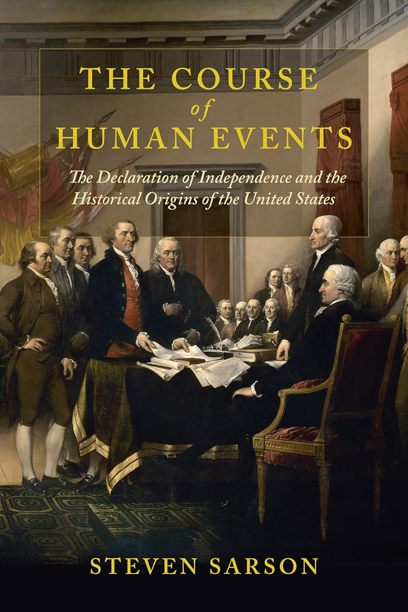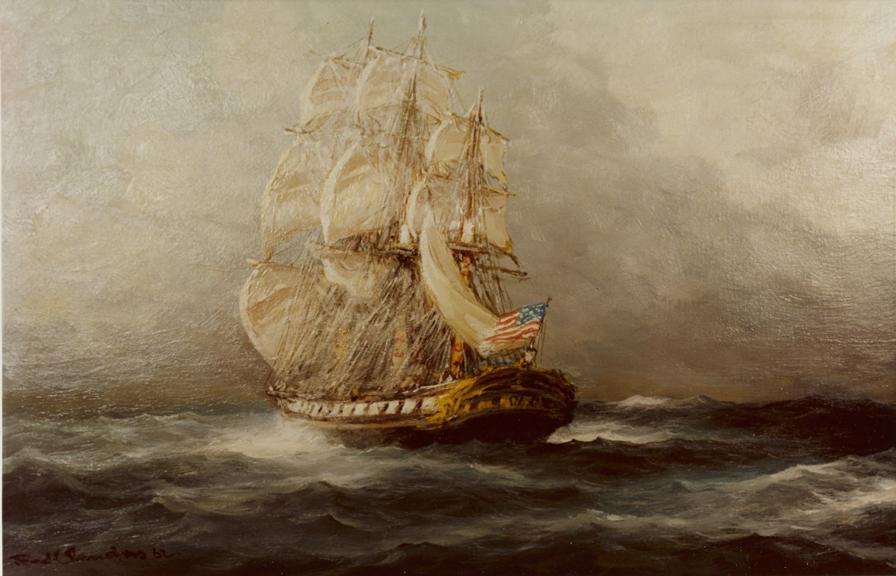Abraham Lincoln’s 1863 proclamation established Thanksgiving as the national holiday we celebrate today, making him the father of modern Thanksgiving.[1] The Revolutionary generation, however, created the first national Thanksgiving holidays 157 years after the Pilgrims and 85 years before Lincoln’s historic proclamation. In this season of football games and parades ending with Santa Claus, it is worth revisiting those first days of giving thanks that Americans celebrated as a new country. Fortunately, Pilgrim Hall Museum in Plymouth, Massachusetts, has assembled the country’s Thanksgiving Proclamations dating back to 1723 through the current administration. That wealth of material offers insights into the Revolutionary War generation’s mindset when it contemplated giving thanks for the benefits received over the course of a year.
Over its lifetime, the Continental Congress issued nine proclamations calling for days of thanksgiving. Puritans had started the practice in England during the English Civil War, but it died out after the Restoration. Yet, the day remained a tradition in New England and was often conceptually paired with days of fasting that served as a kind penance for sins and supplication for future blessings.[2] By the time of the Continental Congress, days of fasting and thanksgiving had become intertwined with politics, as many in the Revolutionary War generation identified liberty as a divine gift that they were obligated to defend.[3] Calls for days of fasting or thanksgiving throughout the colonies had the added benefit of promoting unity by giving everyone an opportunity demonstrate commitment to the Patriot cause.
Politics aside, for the founders, Thanksgiving remained a religious occasion. Over the years, proclamations issued by the Revolutionary War generation demonstrated several consistent themes. First, they believed God was active in the world and intervened in the affairs of men, particularly the United States in its war with Great Britain. Thus, Thanksgiving was a day to celebrate national blessings, not just those received as individuals. In 1778, after the victory at Saratoga and the formal alliance with France, Congress set aside December 30, 1778 as “a day of public thanksgiving and praise, that all the people may, with united hearts, on that day, express a just sense of his unmerited favors; particularly in that it hath pleased him, by his overruling providence, to support us in a just and necessary war,” by causing King Louis of France to enter the war on the American side and giving the Americans victory over British troops.[4] In the 1779 proclamation, those divine interventions expanded to include, “conducting our forefathers to this western world,” progress in the war, a productive agricultural year, commerce, and the spread of the gospel.[5] In 1780, after the discovery of Benedict Arnold’s betrayal and plans to surrender West Point, the Congressional Thanksgiving proclamation thanked God for “rescuing” George Washington and the army from “imminent dangers, at the moment when treason was ripened for execution.”[6] The next year, Congress similarly saw God’s hand in the capture of a British army at Yorktown. In 1784, with the war ending, Congress concluded, “the benign interposition of Divine Providence hath, on many occasions, been most miraculously and abundantly manifested.”[7]
Thanking God for his divine intervention in America’s affairs did not end with the Revolution. The founding generation continued the practice after establishing the country as a constitutional republic under the current U.S. Constitution. George Washington, in his first year as president, offered the first Thanksgiving proclamation under the new constitution in 1789. He proclaimed a Thanksgiving day for the end of November, “That we may then all unite in rendering unto him our sincere and humble thanks – for this kind care and protection of the People of this country previous to their becoming a Nation – for the signal and manifold mercies, and the favorable interpositions of his providence.”[8]
Seeing God’s intervention in their affairs, the Revolutionary generation also viewed the acknowledgment of, and gratitude for, those interpositions as the duty of all Americans. The 1778 proclamation declared it was “the indispensible duty of all men grateful to acknowledge their obligations to Him for benefits received.”[9] The 1781 proclamation was similarly definitive: “it is the duty of all ranks to observe and thankfully acknowledge the interpositions of his Providence in their behalf.”[10] Washington declared it “the duty of all Nations to acknowledge the providence of almighty God” in 1789 and that “it is in an especial manner our duty as a people, without devout reverence and affectionate gratitude, to acknowledge our many and great obligations to Almighty God,” in 1795.[11] President James Madison would simply proclaim, “No people ought to feel greater obligations to celebrate the goodness of the Great Disposer of Events of the Destiny of nations than the people of the United States.”[12]
Thanksgiving was a solemn and public occasion, not one to be celebrated with games or in private. No football, parades, or private meals for thanksgiving celebrants in the country’s early days. The 1778 proclamation recommended “that recreations unsuitable to the purpose of such a solemnity may be omitted on that day.”[13] Congress proclaimed thanksgiving in 1782 to be “a day of solemn thanksgiving,” and in 1781, 1783, and 1784 called for the people “to assemble” to express their thanks to God.[14] For his part, Washington called upon the American people to “unite” or “meet together” in a day of “public thanksgiving and prayer.”[15] Even Madison, who was dedicated to separating church from state, bowed to the religious nature of Thanksgiving, marking the day as one “on which the people of every religious denomination may in their solemn assemblies unite in their hearts and their voices in a freewill offering to their Heavenly Benefactor of their homage of thanksgiving and of their songs of praise.”[16]
Last, but not least, the founding generation envisioned Thanksgiving as a day of supplication in which citizens might beseech God for further national blessings, not merely those they might experience in their private lives. Through it all, the Continental Congress sought a remarkably consistent set of blessings. Returning to that first Proclamation in 1778:
“It is further recommended, that, together with devout thanksgiving, may be joined a penitent confession of our sins, and humble supplication for pardon, through the merits of our Savior; so that, under the smiles of Heaven, our public councils may be directed, our arms by land and sea prospered, our liberty and independence secured, our schools and seminaries of learning flourish, our trade be revived, our husbandry and manufactured increased and the hearts of all impressed with undissembled piety, with benevolence and zeal for the public good.”[17]
Just as America has changed since the Revolution, so has Thanksgiving, becoming more secular and private. The founders would not recognize many of today’s traditions, but there is nothing to stop us from understanding theirs. Perhaps, as we gather for the holiday this year, we might recall those first thanksgivings Americans celebrated as a country, when they gave thanks for the nation’s blessings and not only those that graced the lives around the table.
[1] See, Abraham Lincoln, A Proclamation by the President of the United States of America, October 3, 1863. Available at: http://www.pilgrimhallmuseum.org/pdf/TG_Presidential_Thanksgiving_Proclamations_1862_1869.pdf, accessed October 16, 2015. The 1863 proclamation established the tradition we celebrate today, but it was Lincoln’s third such proclamation, the others coming after battlefield victories earlier in the war.
[2] Benjamin H. Irvin, Clothed in Robes of Sovereignty: The Continental Congress and the People Out of Doors (Oxford: Oxford University Press, 2011), 109-117.
[3] See, for example, James P. Boyd, Sacred Scripture Sacred War: The Bible and the American Revolution (Oxford: Oxford University Press, 2013), 146-154, Kindle Loc. 2595-2735; Derek H. Davis, Religion and the Continental Congress, 1774-1789 (Oxford: Oxford University Press, 2000), chapters 4-5.
[4] A Proclamation by the United States in Congress assembled, November 17, 1778. Proclamations from the Revolutionary War period are available at: http://www.pilgrimhallmuseum.org/pdf/TG_Continental_Congress_Proclamations_1778_1784.pdf, accessed October 16, 2015.
[5] A Proclamation by the United States in Congress assembled, October 20, 1779.
[6] A Proclamation by the Unites States in Congress assembled, October 31, 1780.
[7] A Proclamation by the United States in Congress assembled, 1784.
[8] George Washington, A Proclamation by the President of the United States of America, October 3, 1789. The Presidential proclamations from 1789 to 1815 are available at http://www.pilgrimhallmuseum.org/pdf/TG_Presidential_Thanksgiving_Proclamations_1789_1815.pdf, accessed October 16, 2015.
[9] A Proclamation by the United States in Congress assembled, November 17, 1778.
[10] A Proclamation by the United States in Congress assembled, 1781.
[11] Washington, A Proclamation, 1789, and George Washington, A Proclamation by the President of the United States of America, January 1, 1795.
[12] James Madison, A Proclamation by the President of the United States of America, March 4, 1815.
[13] A Proclamation by the United States in Congress assembled, November 17, 1778.
[14] A Proclamation, 1781; A Proclamation, 1782; A Proclamation, 1783; A Proclamation, 1784.
[15] Washington, 1789 Proclamation, op. cit., Washington, 1796 Proclamation, op. cit.
[16] Madison, A Proclamation, March 4, 1815.
[17] A Proclamation by the United States in Congress assembled, November 17, 1778.









3 Comments
Wonderful bit on an 18th century Thanksgiving.
Thank you for posting.
I give thanks for you giving us this Thanksgiving piece, Eric. It gave me more with which to educate the unknowing masses at the gathering this afternoon. I’ll try to work in that quote from the 1778 proclamation. That says it all.
Thank you so much for that wonderful history of Thanksgiving. It has always been my favorite holiday because it doesn’t have anything to do with getting or giving gifts but being thankful for the many blessings we have as Americans. We always read Scripture at the table to our children and grandchildren. It would be great if churches would have special thanksgiving services for us to attend. I’m so glad you reminded us of our spiritual roots and that our founders were all pretty much on the same page when it came to giving thanks to God.